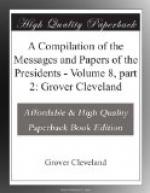In the light of these principles it becomes of great importance to provide just and adequate means, especially for every Department and large administrative office, where personal discrimination on the part of its head is not practicable, for ascertaining those qualifications to which appointments and removals should have reference. To fail to provide such means is not only to deny the opportunity of ascertaining the facts upon which the most righteous claim to office depends, but of necessity to discourage all worthy aspirants by handing over appointments and removals to mere influence and favoritism. If it is the right of the worthiest claimant to gain the appointment and the interest of the people to bestow it upon him, it would seem clear that a wise and just method of ascertaining personal fitness for office must be an important and permanent function of every just and wise government. It has long since become impossible in the great offices for those having the duty of nomination and appointment to personally examine into the individual qualifications of more than a small proportion of those seeking office, and with the enlargement of the civil service that proportion must continue to become less.
In the earlier years of the Government the subordinate offices were so few in number that it was quite easy for those making appointments and promotions to personally ascertain the merits of candidates. Party managers and methods had not then become powerful agencies of coercion, hostile to the free and just exercise of the appointing power.
A large and responsible part of the duty of restoring the civil service to the desired purity and efficiency rests upon the President, and it is my purpose to do what is within my power to advance such prudent and gradual measures of reform as will most surely and rapidly bring about that radical change of system essential to make our administrative methods satisfactory to a free and intelligent people. By a proper exercise of authority it is in the power of the Executive to do much to promote such a reform. But it can not be too clearly understood that nothing adequate can be accomplished without cooperation on the part of Congress and considerate and intelligent support among the people. Reforms which challenge the generally accepted theories of parties and demand changes in the methods of Departments are not the work of a day. Their permanent foundations must be laid in sound principles and in an experience which demonstrates their wisdom and exposes the errors of their adversaries. Every worthy officer desires to make his official action a gain and an honor to his country; but the people themselves, far more than their officers in public station, are interested in a pure, economical, and vigorous administration.




